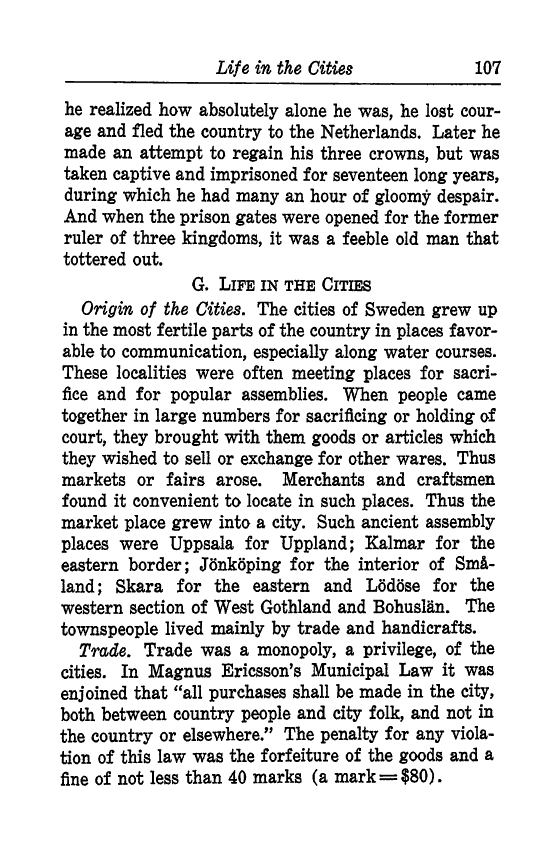
Full resolution (TIFF) - On this page / på denna sida - VI. Period of the Union, 1389–1531 - F. Change of Reign Also in Denmark - G. Life in the Cities

<< prev. page << föreg. sida << >> nästa sida >> next page >>
Below is the raw OCR text
from the above scanned image.
Do you see an error? Proofread the page now!
Här nedan syns maskintolkade texten från faksimilbilden ovan.
Ser du något fel? Korrekturläs sidan nu!
This page has never been proofread. / Denna sida har aldrig korrekturlästs.
Life in the Cities 107
he realized how absolutely alone he was, he lost cour-
age and fled the country to the Netherlands. Later he
made an attempt to regain his three crowns, but was
taken captive and imprisoned for seventeen long years,
during which he had many an hour of gloomy despair.
And when the prison gates were opened for the former
ruler of three kingdoms, it was a feeble old man that
tottered out.
G. LIFE IN THE CITIES
Origin of the Cities. The cities of Sweden grew up
in the most fertile parts of the country in places favor-
able to communication, especially along water courses.
These localities were often meeting places for sacri-
fice and for popular assemblies. When people came
together in large numbers for sacrificing or holding of
court, they brought with them goods or articles which
they wished to sell or exchange for other wares. Thus
markets or fairs arose. Merchants and craftsmen
found it convenient to locate in such places. Thus the
market place grew into a city. Such ancient assembly
places were Uppsala for Uppland; Kalmar for the
eastern border; Jonkoping for the interior of Sm&-
land; Skara for the eastern and Lodose for the
western section of West Gothland and Bohuslan. The
townspeople lived mainly by trade and handicrafts.
Trade. Trade was a monopoly, a privilege, of the
cities. In Magnus Ericsson’s Municipal Law it was
enjoined that "all purchases shall be made in the city,
both between country people and city folk, and not in
the country or elsewhere." The penalty for any viola-
tion of this law was the forfeiture of the goods and a
fine of not less than 40 marks (a mark =$80).
<< prev. page << föreg. sida << >> nästa sida >> next page >>